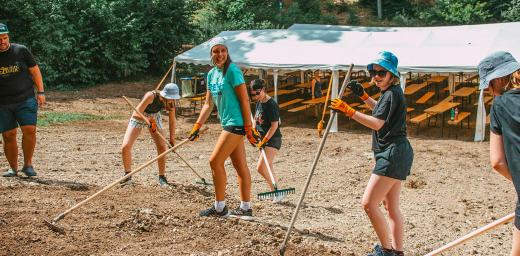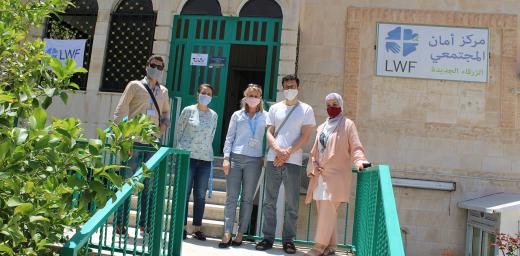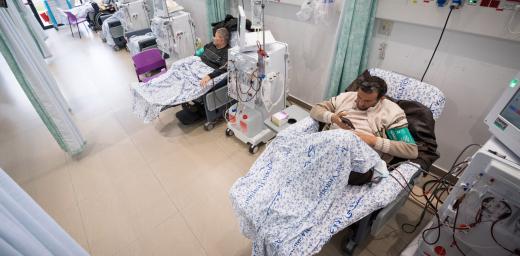COVID-19: Nepal needs additional support for ‘people in distress’
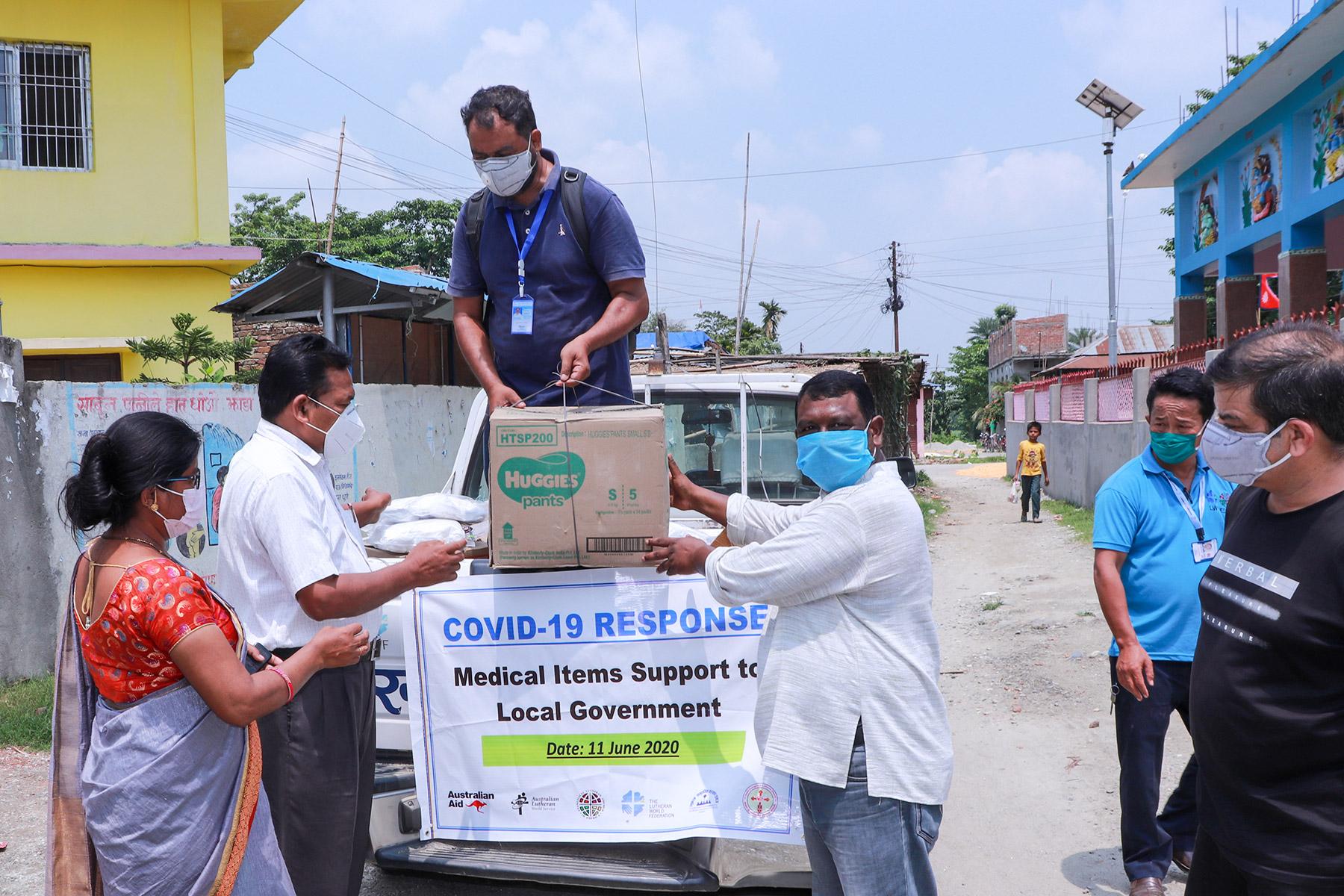
NELC President Rev. Joseph Soren (right) presents packages of medical items and hygiene kits to leaders of Jahada Rural Municipality in Morang district, eastern Nepal. Photo: LCWS/Suman Rai
Medical items to local government, food and hygiene kits for vulnerable communities
(LWI) – Amid a new countrywide lockdown to avert the spread of a second wave of COVID-19, the Nepal Evangelical Lutheran Church (NELC) has requested prayers and support to continue offering hope to marginalized people who are “in distress” due to the pandemic’s impact.
The effect is particularly severe on the most vulnerable communities—Dalits, people living with disabilities and the elderly—that NELC serves through its diaconal arm, the Lutheran Community Welfare Society (LCWS). “Things are going from bad to worse, and living though a pandemic is incredibly difficult. But we have great hope in God,” NELC President Rev. Joseph Soren said.
He was offering reflections as a guest speaker on the weekly online morning prayer hosted by the Geneva Ecumenical Center organizations including The Lutheran World Federation (LWF).
“The majority of essential health facilities are closed and routine services are disrupted because of the unavailability of PPE (personal protective equipment) kits for health workers,” he said. “Lack of oxygen and beds for coronavirus patients is common in every hospital,” he added.
Soren noted the pandemic’s impact on people’s social, health and economic wellbeing during the 2020 lockdown had barely eased in April 2021 when the government imposed tougher measures until the situation improves in the country of 29.1 million people.
According to the World Health Organization (WHO), Nepal had over 464,200 confirmed coronavirus cases and more than 5,200 deaths by 18 May. This represents a significant increase from the 276,980 cases and 3,027 fatalities registered by the end of March this year.
“All schools, colleges, public places, markets and government offices are shut down. People are in fear and worry about the outbreak of a second phase of COVID-19 due to an increasing number of cases and deaths globally,” Soren noted.
Lack of alternative livelihoods
While the country has administered over 2.5 million COVID-19 vaccine doses, and more people are being tested for the virus, testing is still limited and the associated costs are prohibitive for marginalized people who have already lost their sources of income. “Food insecurity, fear of contracting coronavirus, lack of alternative livelihood options, and pressure to earn a living have increased stress and mental health issues,” Soren noted.
Also, protection against the virus is not assured for communities that LCWS supports. They are unlikely to afford hygiene products such as face masks, sanitizers and soap, which are essential in the current situation. They also lack information about taking precautions since they do not have access to television, mobile phones or internet facilities, he said.
LWF’s support
In 2020, LCWS received support through the LWF Churches and Emergencies initiative for NELC’s response to the COVID-19 pandemic. All LCWS personnel became coronavirus frontline workers, raising awareness about the disease symptoms and preventive measures at community level, Soren noted. The church also provided government hospitals in Morang district with essential equipment including hospital beds, oxygen and x-ray machines, PPE kits and thermometers.
In Jhapa and Morang districts, LCWS also distributed soap and facemasks to 2,400 households in Muslim communities.
Looking to the church
Faced with the risks of a new wave of COVID-19 and the lockdown’s impact, “many members of NELC’s congregations and surrounding communities, who were fully dependent on daily wages from casual labor have a tough life now,” Soren said. “They are looking to the church with great hope to start a new way of living and coping with the pandemic.”
They are looking to the church with great hope to start a new way of living and coping with the pandemic,
He affirmed NELC will continue to offer “love and hope to the Nepalese people” during the COVID-19 pandemic, and urged Christian groups and humanitarian organizations around the world to provide additional support.
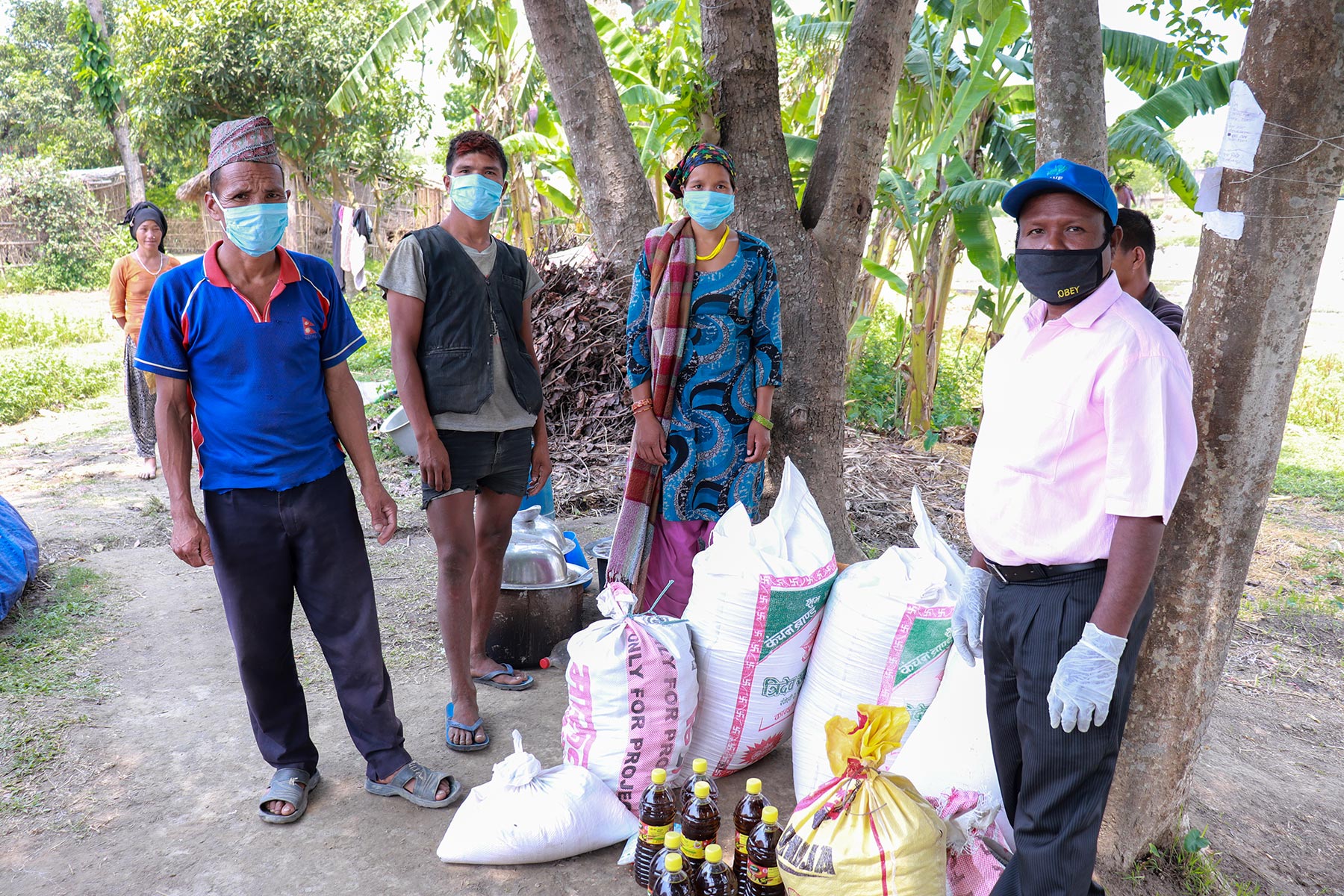
Rev. Patras Marandi (right) distributing food items to casual laborers who could not return home due to the nationwide lockdown. Photo: LCWS/ Roshan Soren
The Nepal Evangelical Lutheran Church has 1,270 members and it joined the LWF in 2010. Its diaconal arm, the Lutheran Community Welfare Society is recognized as a local non-governmental organization that provides services mostly in rural remote regions in eastern Nepal.


